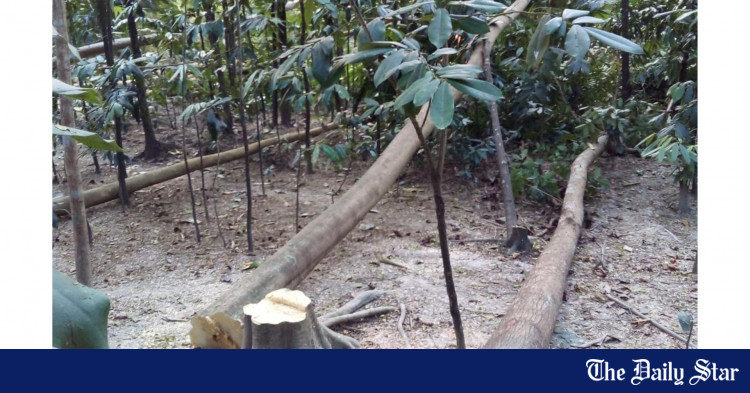Breathing death: The air that kills
File photo: Palash Khan/Star
Every day, as we make our way to the office, we take the usual route through Tejgaon Satrasta or Karwan Bazar to reach Farmgate. Besides, we pass through Shahbagh and Banglamotor regularly.
These places, as many of us know, are some of the most polluted areas in Dhaka. We often feel as if we were walking through a scene from a futuristic dystopia, the smog thick enough to almost touch. And then, of course, there's the cigarette analogy. It's as if someone is lighting up another stick just by breathing in the air. But it's not nicotine -- just the toxic cloud that hangs over us every single day, particularly in winter.
Air pollution has become the biggest killer in Bangladesh, and it's not just some far-off statistic.
According to the Centre for Research on Energy and Clean Air's latest report (published in The Daily Star on January 18), air pollution is directly responsible for 102,456 deaths annually. That's more than the total number of fatalities caused by road accidents or diseases like tuberculosis.
And it's not just the elderly or those with pre-existing conditions -- children, especially, are bearing the brunt of this silent killer.
Every year, 5,258 children die due to lower respiratory infections caused by fine particulate matter (PM2.5), tiny pollution particles that are small enough to enter the bloodstream.
File photo: Star
Then there are the heart disease-related deaths -- 29,920 of them. It's no surprise that ischemic heart disease, stroke, and chronic obstructive pulmonary disease (COPD) are on the rise.
These diseases, along with pneumonia and lung cancer, are directly linked to the pollution in our air.
In total, we're talking about tens of thousands of people whose lives are shortened by this unseen menace.
But the impact doesn't stop there. Air pollution is also causing 900,485 preterm births every year. Imagine that: nearly a million babies born prematurely because the air they breathe is so toxic. The consequences are far-reaching, not only for the infants but for the entire healthcare system.
And this doesn't even touch on the millions of people who seek emergency care every year due to respiratory issues, nor the 263 million lost workdays, a number that hurts our already fragile economy.
The question, of course, is why. Why has air pollution reached these catastrophic levels in Dhaka and the surrounding areas? Well, let's start with the basics. Dhaka is one of the most polluted cities in the world, with the average air quality more than 15 times worse than the World Health Organization's recommended safe levels. It's a combination of several factors that come together to create this toxic environment.
File photo: Palash Khan/Star
Brick kilns are a leading contributor to the severe air pollution in major cities, particularly during the dry season, when these kilns are at full operation. The Department of Environment in 2019 said there are 7,707 brick kilns across Bangladesh, including 2,295 in Dhaka and 1,529 in Chattogram. They emit high levels of harmful particles and gases, significantly impacting air quality.
In cities like Narayanganj, where air quality deteriorates most during the peak kiln season, the AQI often exceeds 300, indicating "severely unhealthy" conditions.
Then, there's the relentless growth of the city.
Dhaka's rapid expansion has led to the proliferation of vehicles -- many of them old, poorly maintained, and emitting thick black smoke.
These vehicles are often inadequately regulated, and their emissions go unchecked.
Next, there's the unplanned construction work.
Piles of sand, bricks, and dust are kicked up into the air, contributing to the problem. While construction is essential to accommodate Dhaka's growing population, the lack of adequate measures to control dust and debris means that our lungs are bombarded with fine particles daily. On top of that, the burning of waste and industrial emissions add more pollutants to the air.
Then there's the impact of seasonal dust storms, often exacerbated by the rapid deforestation in surrounding areas. Pollution from neighbouring countries also finds its way to Dhaka, making the air even worse. It's not just a local problem -- it's a regional one, compounded by the lack of regional cooperation to tackle pollution.
But it doesn't have to be this way. Air pollution is not an inevitable by-product of urbanisation. We have the power to change this. A reduction in vehicle emissions, stricter enforcement of construction dust control measures, better waste management practices, and the introduction of cleaner technologies in factories and power plants are all essential steps. Moreover, the government must prioritise air quality, setting stricter pollution standards and ensuring that these regulations are enforced.
Real-time pollution monitoring, like the dashboard introduced at the recent CREA event, is also a crucial tool in combating air pollution. By making pollution levels more transparent, we can hold both the government and industries accountable for their role in the crisis.
If we act now, we could make a real difference. According to the CREA report, reducing pollution to meet national air quality standards could reduce deaths by 19 percent.
But meeting the WHO guidelines could save an astonishing 81,282 lives each year. We cannot afford to ignore this any longer.
Dhaka's air pollution is not a problem we can simply look away from. It is a crisis that demands immediate action from all levels of government, as well as from industries and individuals. It's time to breathe life back into our city.
We must demand change, for ourselves and for future generations. This is no longer a matter of inconvenience; it is a matter of survival. The government must take the lead, but we, too, must play our part in holding those responsible accountable. The longer we wait, the more lives we will lose. And those lives could have been ours.














































